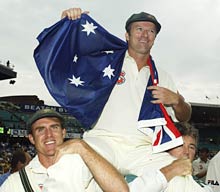When Damien Martyn top-edged a sweep and walked off the field, Australia were in a spot of bother at 170-3, still adrift by 273 runs on a fifth day wicket.
The situation was right up Steve Waugh's alley.
Out he strode and batted for three hours, walking off only when Australia were out of danger. His 80, arguably, saved Australia from losing the series.
But did Australia err in what could have been the greatest run chase of all time?
That a team which prides itself on raising the bar in world cricket settled for a draw was intriguing. The Australians know only so much about defensive play as can fit on the back of a stamp. At least that was the impression they have conveyed so far.
Were they so floored by the sentimental farewell for their skipper that despite being in the hunt they squandered a chance for a great win and settled for a draw?
When Ricky Ponting departed with the score reading 196, Australia still needed 247 runs off 38 overs at an asking rate of 6.5 per over. It was admittedly a difficult task, but not impossible.
It would have been a great move to promote Adam Gilchrist ahead of Simon Katich to chase some quick runs. A 30 minute Gilchrist show would probably have brought down the asking rate and made the game intriguing. Instead of jumping on the listless Indian bowling and going for the jugular, Australia were satisfied with an 80 from Waugh and a draw that saw the Gavaskar-Border Trophy remain with the visitors. Of course, no one is complaining that India retained the trophy, but most missed the all or nothing Australian style. Their bland approach exposed a weak heart beneath the veneer of confidence. Even Zimbabwe skipper Heath Streak took a swipe at the Australians, saying they resembled a lawn bowls team.
Had Gilchrist or Katich been promoted ahead of Waugh, the story might have taken a different twist. It was clearly worth a try because, had the move failed, Waugh could have come in and put up his famous rearguard action in his last Test innings.
The Indian bowling had lost its teeth with the only bowler who looked capable of taking wickets worn down by the sheer number of overs he bowled in the Test (88.5 in both innings combined). Though the pitch wasn't exactly a batting paradise, the Australians had batted at a steady pace of 3.5 runs per over to stay in the hunt even when Ponting was dismissed. This begs a few questions: Why did the batting get animated when only six overs were left for the Test to end? Why wasn't the attack launched in the final session, when the target looked inviting enough? Or was it that the thought suddenly occurred to Waugh that he could add another bit to the fairytale and go out with a century? Did personal ambition cloud team interests?
All kinds of excuses can be offered about the total being too high, the Indian bowlers pitching it outside the leg-stump in the rough, and the highest successful fourth innings chase at Sydney being 276 almost 106 years ago. That last statistic sounds very intimidating indeed, but then scoring 347 runs in 90 overs on the last day of a Test, which was what the Aussies eventually did, was more daunting than most think. Add to that the generous helping of glaring umpiring errors, which through the series were more consistent than Rahul Dravid and Ricky Ponting put together.
Two years ago when New Zealand set Australia a fourth innings target of 440 runs in 110 overs, they ended at 381-7 with Gilchrist threatening to overhaul the target. Barring Mark Waugh, the Australian batting line-up was the same. On the last day, Australia managed to score 312 runs off 93 overs. Against the Indians, the Australians scored at a slightly better rate, yet they failed to take that extra step to live up to their world champions tag.
Waugh's slog-sweep -- a shot that has fetched him a lot of runs -- proved to be his undoing when Sachin Tendulkar caught him on the square-leg fence. "There was no downside about that," he said in his last press conference as captain of Australia. "In some ways I owed the crowd what happened." Waugh's farewell was emotional, one that will not be forgotten in a long, long time. But from a man who never gave in to any emotions and once played to ensure New Zealand's ouster from the 1999 World Cup amidst loud jeers, that last statement was disappointing. "It may have been a costly shot, but we took a lot of risks in the last 15 overs the way it was," Waugh continued. "I'm not going to overly worry about that one shot that was out. I did not hesitate. I got out. That's cricket." Ian Chappell once told me when discussing team selection and strategy, "It's about Australian cricket, not about Steve Waugh."
But at the Sydney Cricket Ground on January 6, 2004, it was about Steve Waugh. With due respect to Steve Waugh and his contribution to world cricket, his innings, which may have saved Australia the blushes, probably also stopped them from winning the Test, or at least giving them the chance to win it.
With due respect to Steve Waugh and his contribution to world cricket, his innings, which may have saved Australia the blushes, probably also stopped them from winning the Test, or at least giving them the chance to win it.






